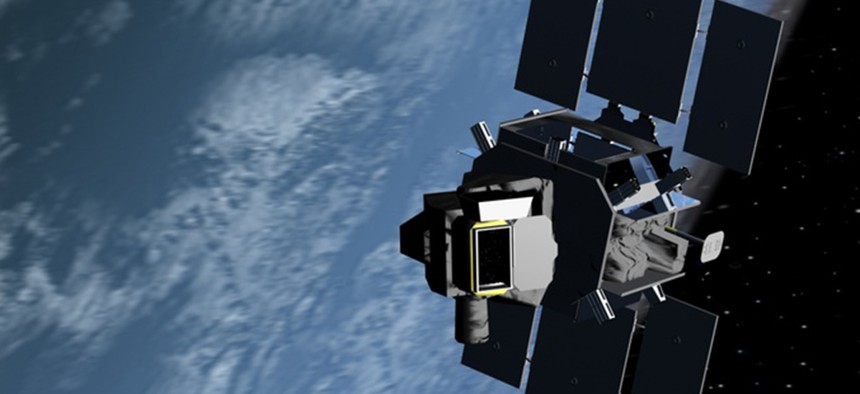Do We Need Air Traffic Controllers For Space?

The Air Force's Space Based Space Surveillance satellite keeps tabs on spacecraft and orbiting junk 390 miles up. U.S. Air Force
If the U.S. doesn’t take the lead in guiding satellites through increasingly crowded orbits, someone else will.
COLORADO SPRINGS, Colorado — The world’s spacefaring nations need the orbital equivalent of air traffic controllers — the cool professionals who guide planes from airport to airport — to direct satellites and other spacecraft in their increasingly crowded flight paths above the Earth’s atmosphere, U.S. officials say.
They envision a civilian-run “satellite management” agency, akin to the Federal Aviation Administration, and possibly even the FAA itself, overseeing this effort.
“We’re going to have to figure out how to do it,” said Douglas Loverro, deputy assistant defense secretary for space policy, at the National Space Symposium, an annual conference here sponsored by the Space Foundation. “It’s going to take a decade or more, but we have to go [down] that path now.”
Currently, the Air Force monitors and tracks objects in space to keep U.S. satellites safe. Among the hazards are hundreds of thousands of pieces of space debris traveling upward of 17,000 miles per hour. The U.S. has needed to reposition satellites to avoid wreckage created in 2007 by a Chinese test of an anti-satellite weapon. Then, there are thousands of working and dead satellites orbiting Earth, with many more commercial spacecraft expected to launch in coming years.
“If you look at layers of orbit, in some of these orbits we will see a 100- to 1,000-percent increase in the number of objects” in space, Loverro said. “That is a space traffic management problem.”
Tomorrow’s space traffic managers won’t necessarily control satellites as tightly as today’s air traffic controllers do planes.
“I don’t know if that will ever be done,” he said. “But I do know that we need somebody to be able to go ahead and look at the problem and say, ‘Maybe you should adjust your orbital parameters to go ahead and reduce collision risk.’”
“If we think that this is going to be a problem,” he said, “we need a regulatory structure to do this. I think the first entree into that is allowing FAA into the space traffic monitoring game, which will eventually, I think, lead to a space traffic management.”
Rep. James Bridenstine, R-Okla., at the Space Symposium on Tuesday announced sweeping legislation that would require the government to put an agency in charge of space traffic management by 2020.
Loverro said he is agnostic as to which agency should oversee the management. But he does believe that the United States should take the lead, lest another country, one that might not have America’s best interests in mind, swoop in.
“I would like the U.S. to be preeminent in establishing those rules … in the same way we were preeminent in air in establishing air traffic management rules, [which are] now propagated throughout the world,” he said.
The many arms of the military that have assets in space, Loverro said, “are all on the same sheet of music on this.”
Air traffic controllers today seamlessly manage both civilian and military aircraft. But when rockets are launched, large swaths of airspace are shut down.
“We have got to do something about that and there has to be a way that we can allow … routine space launch activities to happen that are going through national airspace,” said Pamela Melroy, deputy director of the Tactical Technology Office at DARPA, the Pentagon’s research agency.
Melroy said rockets might carry aircraft transponders, allowing civil air traffic controllers to monitor launches. That air traffic controller could “hand off” the rocket to a space traffic controller the way airliners get passed seamlessly between FAA centers.
“Another reason why we should be thinking about the FAA,” Melroy said, is “because I think this is where it’s going to end up.”






